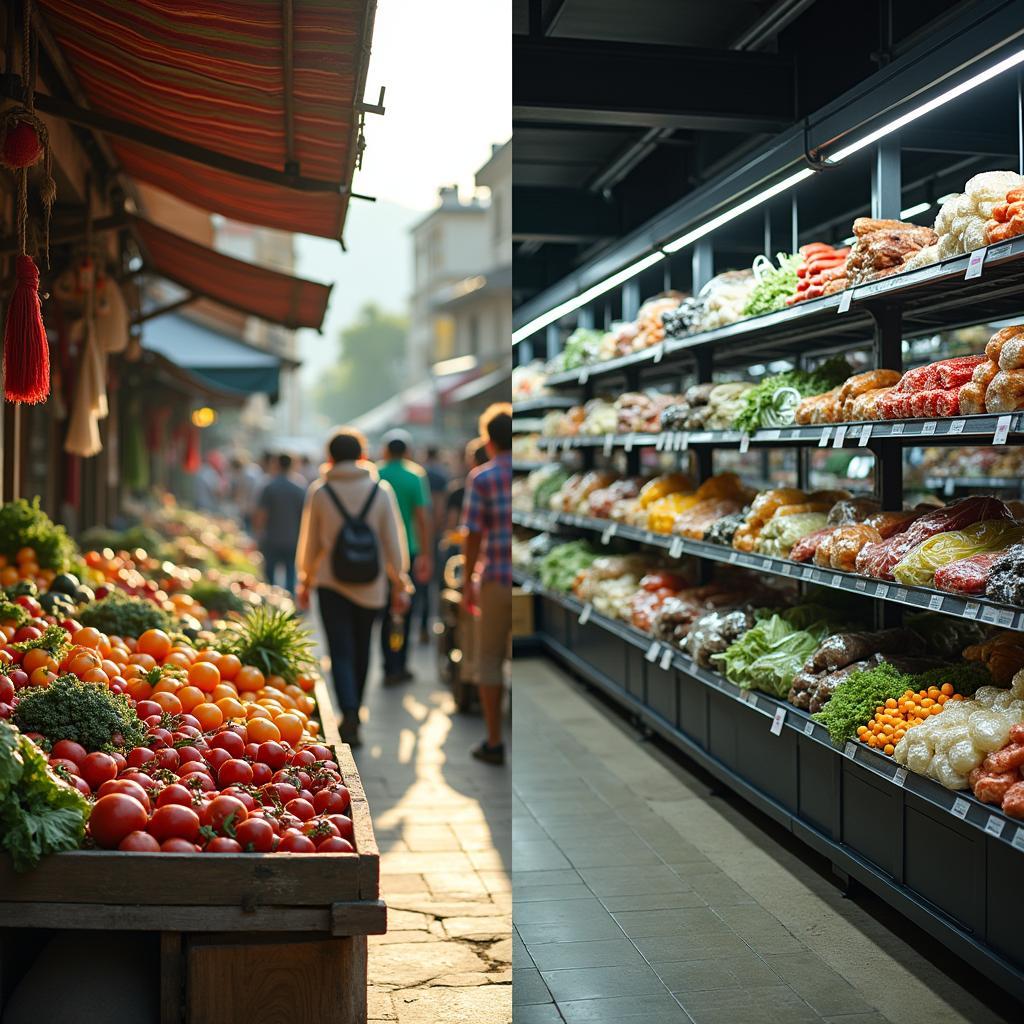Analyzing past IELTS exams reveals that topics related to globalization’s effects on food systems frequently appear in Writing Task 2. This theme intersects with several key global issues including cultural preservation, environmental sustainability, and economic development, making it highly relevant for future tests.
Nội dung bài viết
Let’s examine a common question type on this topic:
Some people believe that globalization has negatively impacted traditional food cultures and eating habits worldwide. Others argue it has brought positive changes to how we produce and consume food. Discuss both views and give your opinion.
Analysis of the Question
- Topic: Impact of globalization on food systems
- Task: Discussion + Opinion
- Key areas to cover:
- Traditional food cultures
- Modern food production/consumption
- Positive and negative impacts
- Personal stance

Sample Essay 1 (Band 8.5)
The globalization of food systems has sparked considerable debate regarding its influence on traditional dietary practices. While some perceive this transformation as a threat to cultural culinary heritage, others celebrate the enhanced accessibility and diversity of food options. In my view, while globalization has brought significant advantages to global food systems, careful measures must be taken to preserve traditional food cultures.
Similar to the effects of globalization on food security, the modernization of food production and distribution has yielded substantial benefits. International food trade has improved food availability and affordability, enabling populations worldwide to access diverse nutritional options previously unavailable locally. Moreover, technological advancements in agriculture and food processing have enhanced food safety standards and extended shelf life, reducing waste and improving efficiency.
However, this global food revolution has notably impacted traditional eating habits, as explored in the influence of fast food culture on traditional eating habits. Local food practices, often deeply rooted in cultural identity and traditional knowledge, face increasing pressure from standardized global food trends. The proliferation of international restaurant chains and processed food products has led to a homogenization of dietary patterns, potentially threatening the preservation of unique culinary traditions.
To address these challenges while maximizing benefits, a balanced approach is essential. Governments and communities should implement policies that protect and promote traditional food cultures while embracing the advantages of global food systems. This could include supporting local farmers’ markets, documenting traditional recipes, and encouraging cultural food festivals, while simultaneously ensuring food safety and accessibility through modern distribution networks.
Sample Essay 2 (Band 6.5)
Globalization has changed how people eat and make food around the world. Some people think this is bad for traditional food culture, but others say it helps make food better and easier to get. I think globalization has both good and bad effects on food.
The good thing about globalization is that people can now eat different kinds of food. For example, in my country, we can now buy fruits from other countries all year. Also, new cooking methods from other places have made our food better. Modern farms can grow more food to feed more people.
But there are problems too. Many young people prefer fast food to traditional food now. Some old recipes are being forgotten because people don’t cook them anymore. Traditional restaurants are closing because they can’t compete with big international food chains.
I think we need both new and old ways of food. We should keep our traditional food culture but also use good things from other countries. Governments should help protect old food traditions while making sure people can get enough good food to eat.
Band Score Analysis
Band 8.5 Essay:
- Task Response (9): Fully addresses all parts with clear position
- Coherence/Cohesion (8): Logical organization with clear progression
- Lexical Resource (9): Sophisticated vocabulary precisely used
- Grammar (8): Wide range of structures with high accuracy
Band 6.5 Essay:
- Task Response (6): Addresses main points but less developed
- Coherence/Cohesion (7): Clear organization but simpler linking
- Lexical Resource (6): Adequate vocabulary with some errors
- Grammar (7): Mix of simple and complex structures
Key Vocabulary
- culinary heritage (n.) /ˈkʌlɪnəri ˈherɪtɪdʒ/ – traditional food culture
- homogenization (n.) /həˌmɒdʒənaɪˈzeɪʃən/ – process of becoming uniform
- proliferation (n.) /prəˌlɪfəˈreɪʃən/ – rapid increase
- dietary patterns (n.) /ˈdaɪətəri ˈpætənz/ – eating habits
- standardized (adj.) /ˈstændədaɪzd/ – made uniform
Advanced Sentence Structures
- Complex with concession: “While globalization has brought significant advantages to global food systems, careful measures must be taken to preserve traditional food cultures.”
- Complex with relative clause: “Local food practices, which are deeply rooted in cultural identity, face increasing pressure from standardized global food trends.”
- Compound-complex: “The proliferation of international restaurant chains has led to a homogenization of dietary patterns, potentially threatening the preservation of unique culinary traditions.”
For practice, try writing your own essay on this topic and share it in the comments below for feedback.